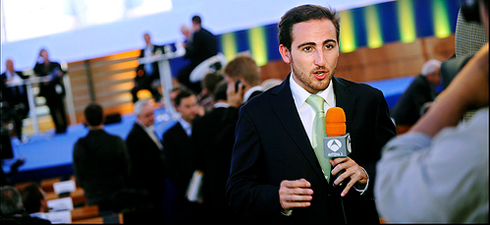Winner of a prestigious award in her home country and fluent in three languages, Ina Strazdinais the most influential Latvian journalist in Brussels, the home of the European Union. But even she admits that the competition is not too tough. Though she worked alongside three competitors when she arrived in Brussels in 2006 — and one more later joined them — Ms. Strazdina is the last Latvian journalist in the E.U. press corps. To make ends meet, she does three jobs: reporting for Latvian Radio, Latvian TV and the daily newspaper Latvijas Avize — churning out almost all the news that reaches Latvia from Brussels.
Around the globe, journalism jobs are being cut as the combined effects of the economic downturn and the Internet threaten the viability of traditional media organizations. In Brussels, the trend is particularly acute among the former communist countries that joined the Union in 2004. The financial situation is so difficult that not a single media outlet from Lithuania, an E.U. member, has a correspondent permanently based in Brussels. This downsizing accompanied the arrival of the bloc’s Lisbon Treaty, which promoted a global role for the European Union while granting new powers to institutions like the European Parliament, initiatives that needed the support of all member states.
According to the International Press Association, or A.P.I., the number of accredited reporters covering the European Union, whose member states have more than 500 million citizens combined, has dropped by more than one-third since 2005. Pia Ahrenkilde Hansen, a spokeswoman for the commission, said it was worrying that media coverage from new members states was disappearing. “It is very important to have a presence in Brussels ,” she said. “Who would dream of covering Westminster without being on the London parliamentary circuit?” Read full article in International Herald Tribune...
Was this article useful? If so we are delighted!
It is freely available because we believe that the right to free and independent information is essential for democracy. But this right is not guaranteed forever, and independence comes at a cost. We need your support in order to continue publishing independent, multilingual news for all Europeans.
Discover our subscription offers and their exclusive benefits and become a member of our community now!












